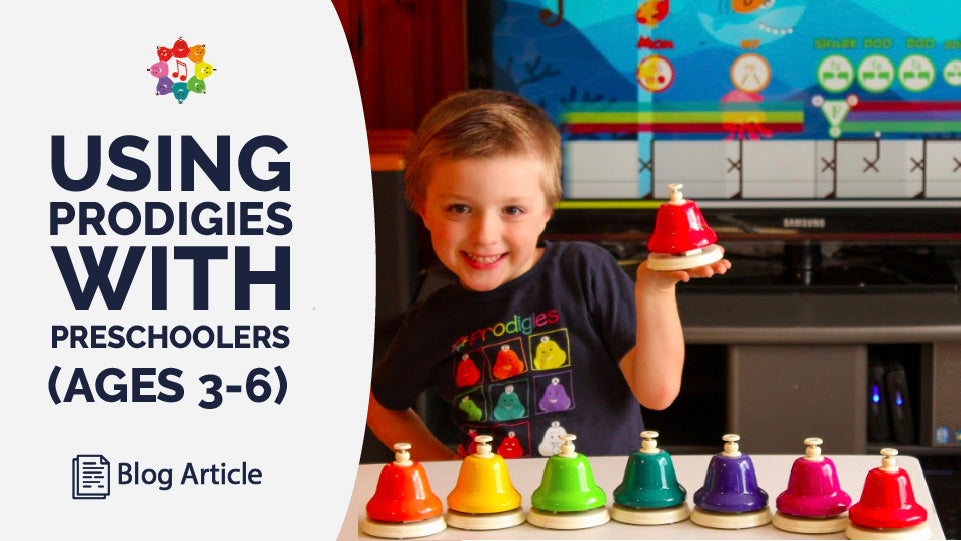This is the age where kids can really start working through curriculum workbooks, songbooks & video lessons to greater effect.
Where to Start With My Preschooler
Below you can also find the 8 Course Progressions we’ve put together for Preschool or early Elementary Beginners!
Level 1A (Year 1)
Get Started with Easy Lessons for Preschoolers or Beginners
Level 1B (Year 2)
Good for Older Preschool & Elementary Beginners
Whatever kind of set up you go with, keep in mind that children at this age (3-6) are prime for what we call “meaningful and memorable play with individual notes.” Kids at this age aren’t the best at reading music or playing the piano, but they have the unique skill of being able to develop perfect pitch in this time frame, so focus on the individual sounds and concepts in Preschool Prodigies and PsP Melodies to make the most of the 3-6 years.
At this age, you’ll be working mostly from Preschool Prodigies, but you’ll be able to mix in PsP Melodies lessons as you go to keep things fresh and also to help reinforce the hand-signs.
Anytime you’re instrument free, you’ll want to work from PsP Melodies. Then once your kids get the hang of the hand-signs, they’ll be able to use them wherever they might otherwise be using an instrument.
You’ll also be able to explore the Easy level of Holiday Prodigies and the early Chapters of Primary Prodigies.
Finally, Performance Prodigies consists of a lot of 3 note songs in the treble clef. Many of the songs come straight from the Preschool Prodigies series, just in a more Orff styled format.
Instruments We Recommend for Preschoolers
We HIGHLY reccomend C Major Deskbells for preschoolers! They’re durable and easy to play and allow kids to receive meaningful and memorable play with pitch during their critical period for auditory development.
You can find C Major Bells by searching the web for CNDBD (sometimes written as CNDB-D).
You can find them on Amazon here or search all of Amazon for CNDB-D here.)
Preschoolers are also prime to start beginner piano lessons! You can follow along with Playtime and Preschool Prodigies on piano as well, and we’re working on getting Piano Prodigies together for the fall of 2020.
Key Concepts to Focus on for Ages 3-6
With infants and toddlers, you want to focus on giving them three types of musical exposure.
Beginner Instrumental Instruction with Deskbells, Mallets or Piano
Once your kids have some hand-eye coordination and a bit longer of an attention span, it’s time to start learning simple melodies and songs on the deskbells!
This is what Prodigies excels at, and you can use the Level 1A Courses suggested above to learn lots of popular preschool melodies.
Absolute/Perfect Pitch Development
Preschoolers are in the height of the critical period for auditory development which means you can teach them the amazing skill of perfect pitch.
You can do this with programs like Prodigies, the Taneda Method, Nuryl & more!
Solfege Hand Signs
The Solfege Hand Signs are another fundamental skill that will help develop your child’s ear and voice simultaneously.
The Curwen hand signs pair the Solfege syllables with easy to remember signs that help develop strong pitch recall.
We do A TON of hand-signing in Prodigies, and you can visit our Melodies collection for hand sign centric videos.
Free Play
All kids learn through play, and simply having musical instruments & activities around the home or classroom is the first step to activating your child’s sense for musical wonder
Meaningful Exposure to Individual Notes
This is the important and powerful idea of letting children explore one note at a time with bells, Boomwhackers or other instruments that let you focus on a single note. This is what Prodigies excels at, especially for young kids.
High Information Music
Letting kids listen to complicated music (jazz, classical, north Indian, improv, etc) will help expand their idea for what’s possible for music. For a great High Information Music app, check out Nuryl.
Singing, Composing & Improvising
Once kids start becoming more verbal, you can do A TON of work by just singing different songs, melodies, rhymes and folk songs.
At 2 and a half, our daughter just sings about EVERYTHING she’s doing. Painting, cooking in her kitchen, getting dressed – – she sings about everything.
At this age, attention spans are super short. Thankfully, you can sing about pretty much anything, so it can happen more regularly throughout the day.
We do our best to model this by parodying our favorite songs with funny things happening at home. We sing about brushing our teeth, getting dressed, going for walks – – all the best stuff!

